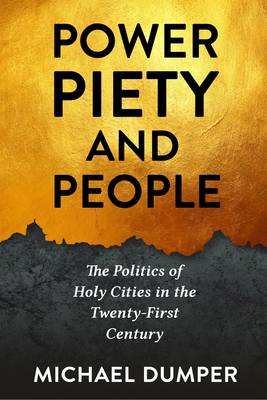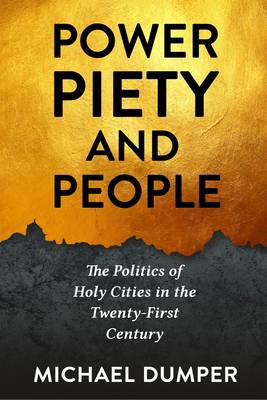
Door een staking bij bpost kan je online bestelling op dit moment iets langer onderweg zijn dan voorzien. Dringend iets nodig? Onze winkels ontvangen jou met open armen!
- Afhalen na 1 uur in een winkel met voorraad
- Gratis thuislevering in België vanaf € 30
- Ruim aanbod met 7 miljoen producten
Door een staking bij bpost kan je online bestelling op dit moment iets langer onderweg zijn dan voorzien. Dringend iets nodig? Onze winkels ontvangen jou met open armen!
- Afhalen na 1 uur in een winkel met voorraad
- Gratis thuislevering in België vanaf € 30
- Ruim aanbod met 7 miljoen producten
Zoeken
Power, Piety, and People
The Politics of Holy Cities in the Twenty-First Century
Michael Dumper
Paperback | Engels
€ 59,45
+ 118 punten
Uitvoering
Omschrijving
Conflicts in cities that have particular religious significance often become intense, protracted, and violent. Why are holy cities so frequently contested, and how can these conflicts be mediated and resolved?
In Power, Piety, and People, Michael Dumper explores the causes and consequences of contemporary conflicts in holy cities. He explains how common features of holy cities, such as powerful and autonomous religious hierarchies, income from religious endowments, the presence of sacred sites, and the performance of ritual activities that affect other communities, can combine to create tension. Power, Piety, and People offers five case studies of important disputes, beginning with Jerusalem, often seen as the paradigmatic example of a holy city in conflict. Dumper also discusses Córdoba, where the Islamic history of its Mosque-Cathedral poses challenges to the control exercised by the Roman Catholic Church; Banaras, where competing Muslim and Hindu claims to sacred sites threaten the fragile equilibrium that exists in the city; Lhasa, where the Communist Party of China severely restricts the ancient practice of Tibetan Buddhism; and George Town in Malaysia, a rare example of a city with many different religious communities whose leaders have successfully managed intergroup conflicts. Applying the lessons drawn from these cities to a broader global urban landscape, this book offers scholars and policy makers new insights into a pervasive category of conflict that often appears intractable.Specificaties
Betrokkenen
- Auteur(s):
- Uitgeverij:
Inhoud
- Aantal bladzijden:
- 384
- Taal:
- Engels
Eigenschappen
- Productcode (EAN):
- 9780231184779
- Verschijningsdatum:
- 14/07/2020
- Uitvoering:
- Paperback
- Formaat:
- Trade paperback (VS)
- Afmetingen:
- 152 mm x 226 mm
- Gewicht:
- 521 g

Alleen bij Standaard Boekhandel
+ 118 punten op je klantenkaart van Standaard Boekhandel
Beoordelingen
We publiceren alleen reviews die voldoen aan de voorwaarden voor reviews. Bekijk onze voorwaarden voor reviews.











